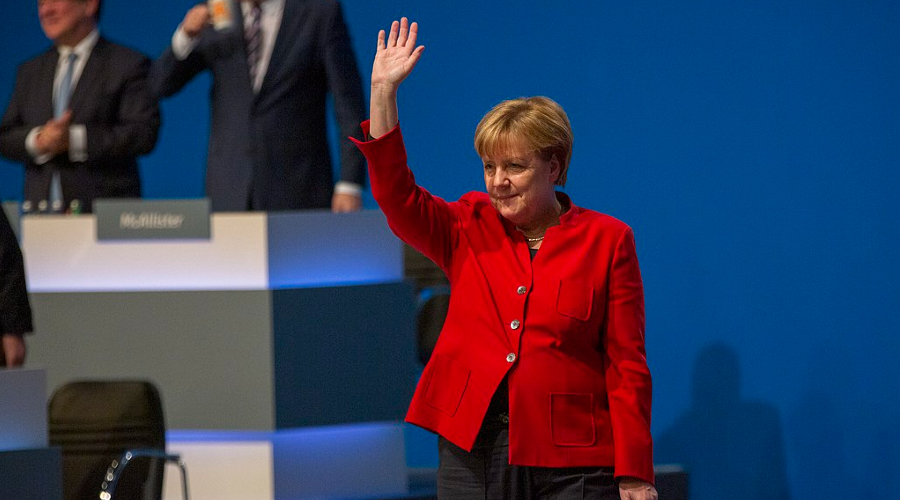Germany Without Merkel
Chancellor Merkel is leaving office, but fundamental change in Germany’s foreign policy is unlikely.

Published by The Lawfare Institute
in Cooperation With

Editor’s Note: After 16 years in office, Angela Merkel—Germany’s chancellor and one of Europe’s giants—will step down and be replaced this September. Inga Trauthig of King’s College London and Marcel Dirsus of Kiel University explore who might replace Merkel and argue that Germany’s foreign policy is not likely to change significantly after her departure.
Daniel Byman
***
On Sept. 26, Germany will hold national elections that will determine Angela Merkel’s successor. After dealing with a known quantity for 16 years, Germany’s allies are wondering where Berlin will go from here. A stark policy change is unlikely. In the most probable scenario, economic considerations and Germany’s postwar identity will continue to dominate foreign policy.
Merkel has outlasted most of her international counterparts (Putin being a rare exception), which means she carries diplomatic weight and accumulated influence built over her many years in power. And while Merkel has won praise for her steady hand and reliability, allies have grown frustrated with Germany’s hesitancy and inaction. German officials give grand speeches, but when solidarity means expending military resources, they rarely keep their promises. As a consequence, Germany is routinely accused of freeloading—for example, by its NATO allies.
It is uncertain who will replace Merkel, but current polling suggests she might have a female successor, albeit from a different party. In a well-coordinated and closely watched process, the Green Party chose Annalena Baerbock, a popular member of parliament with little executive experience, as its lead candidate. Baerbock has been riding a wave of success since her nomination. In addition to the inherent benefit of being a fresh face after 16 years of Merkel, she is widely regarded as likeable and benefits from the popularity of the Green Party’s stringent climate policies, a topic of increasing electoral importance. Merkel’s conservative bloc (an alliance between the Christian Democratic Union and Christian Social Union, or CDU/CSU) chose Armin Laschet, the current governor of Germany’s largest state, in a messy but also closely watched process. Laschet has been struggling to build support. He is regarded mostly as a proponent of continuity with few new impulses, and he has a history of gaffes when talking about foreign policy issues. In addition, he dithered as state governor over the course of the coronavirus pandemic. So how might either one of these new chancellors transform Germany’s foreign policy?
Merkel’s Germany has been defined by a near total commitment to economic interests. The country is renowned for trading its continuous prosperity against other interests like national security or the safety of its allies. Berlin has used its sway to ensure Greek fiscal compliance, push investment deals with Beijing and defend the Nord Stream 2 gas pipeline against intense pressure from allies. The project faces bipartisan opposition in the United States, and many of Germany’s European allies are worried that the pipeline will strengthen the Kremlin at the expense of Ukraine and other transit countries. Instead of working toward the EU’s stated aim of diversifying Europe’s energy supply, it runs the risk of making Germany more dependent on Russian energy.
When Germany does something other than pursue its short-term economic interest, it’s usually either ineffective, the result of overwhelming allied pressure, or both. Take Libya. It’s not Germany’s highest priority, but it’s a conflict that Germany would like to see end—not least because the country is a key hub for irregular migration to the European Union. Berlin tried to end the conflict by organizing a conference. Other countries backed militias and deployed drones to create facts on the ground, but in Germany, the option of using meaningful military force was never seriously considered. It would be inaccurate to say that Germany never contributes anything to military operations. When allies apply enough pressure, Berlin does deviate from its usual playbook, but even then, it is usually reluctant. The fight against the Islamic State is a good example. While Germany eventually decided to join, it confined itself to reconnaissance, aerial refueling and training while its allies did the actual bombing. That’s not because Germany’s military lacks tools to fight the Islamic State. The Bundeswehr is plagued by severe problems, but it could have done more to fight the terrorist group if politicians had allowed it to do so. They didn’t.
Germany’s obsession with maintaining strong trade relationships is partnered with an inclination to refrain from blatant use of military power. It eschews a more independent or assertive foreign policy course, in part as a result of Germany’s post-WWII state identity that survived reunification. Merkel’s Germany has tried to be all things to all people in a world that simply doesn’t work that way. While this behavior is couched within conciliatory explanations of diplomatic prerogatives, the outcome is that Germany is barely taken seriously. Its adversaries know that they will not face consequences for malign behavior, and its allies cannot trust it for that same reason.
With the most likely post-Merkel coalition being between the center-right CDU/CSU and the center-left Greens, some of that is set to change. At least in theory, the Greens are much more willing to stand up to authoritarian regimes than either the Christian Democrats or the Social Democrats—even if it means incurring economic pain. They oppose Nord Stream 2, and they are significantly more likely to support Russian civil society or the protesters in Hong Kong. The Green foreign policy platform is idealistic. Where Merkel compartmentalized policy to let German companies make money around the world, the Greens explicitly tie the economy to human rights.
That said, there would be some continuity as well. Although they have moderated their stance, the Greens remain extremely skeptical of hard power. They are opposed to use of force in almost all cases and rarely support German military engagements abroad. They dislike armed drones, want to withdraw from NATO’s nuclear sharing and are explicitly campaigning against NATO’s 2 percent spending target. And while they say they support more efforts at European integration, they are often opposed to it when it comes to arms exports.
There’s a possibility that a Black-Green (or Green-Black) coalition between Christian Democrats and the Green Party would mean the best of both worlds. With Merkel out of office, Germany could become a more serious country that’s willing to use its full resources to advance interests other than short-term economic gain. Unfortunately, that’s unlikely. The much more probable scenario is a continuation of Merkel’s muddling along. Germany’s entire political system is designed to build compromise, and even strong Greens intent on a dramatic shift wouldn’t be able to effect fundamental change. Beyond that, today’s Greens aren’t as revolutionary as they used to be. Rhetoric would change, but aside from some issues like climate change, German policy would remain more or less the same. As an export-oriented middle power with a strong aversion to using force and few immediate military threats, Germany will continue to try to avoid taking responsibility wherever possible. It will say that it wants to defend the multilateral order, but it won’t expend resources on doing so. It will commit to “doing more” when it comes to defense, but it won’t actually spend the 2 percent to which it has agreed. The list goes on.
So what does that mean for the United States? First of all, don’t expect too much. Some observers have painted the Greens as hawks who would align with America to deal with Moscow or Beijing. That’s inaccurate. There would be closer alignment on some issues like Nord Stream 2, but any government that includes the Greens would also create significant new transatlantic fault lines. If Americans are disappointed with Germany’s aversion to exercising hard power now, they will be even more frustrated by Berlin if the Greens wield power.
The United States should prepare for a continuation in Germany’s foreign policy, both good and bad. Now is the time to engage with Green leadership to figure out how rhetoric on human rights and the liberal international order can lead to concrete transatlantic policies. If Americans don’t expect too much and take the time to find common ground with the potential new German government, both sides will benefit.






